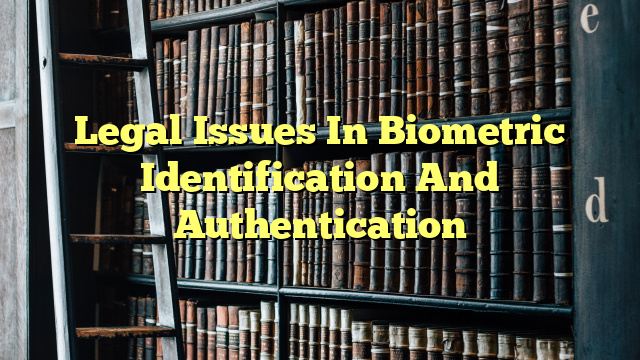Table of Contents
- Introduction
- Main Problems with Biometric Authentication
- Ethical Issues with Biometric Security
- Privacy Issues with Biometric Authentication
- Conclusion
Introduction
Biometric identification and authentication is the process of using biometric data, such as fingerprints, iris scans, facial recognition, or voice recognition, to identify an individual’s identity or verify a person’s identity. In recent years, the use of biometric authentication has become increasingly popular in both the public and private sectors, and is used for everything from access control to identity management. The widespread use of biometric authentication has raised legal issues, as biometric data is considered highly sensitive personal data, and is subject to privacy and data protection laws. The legal issues that arise from the use of biometric authentication can be divided into two main categories: problems relating to the accuracy and reliability of biometrics, and ethical and privacy issues.
Main Problems with Biometric Authentication
The most common problem associated with biometric authentication is that it is not always accurate. Biometric authentication systems rely on the accuracy of the data being collected, and if the data is inaccurate, the system will be unable to accurately verify a person’s identity. This can lead to errors in the system, and can result in individuals being denied access when they should be allowed access, or vice versa. In addition, biometric authentication systems are often vulnerable to hacking or other forms of malicious interference, as the data being collected can be manipulated or stolen.
Ethical Issues with Biometric Security
The use of biometric authentication also raises ethical issues, as it can be used to monitor individuals without their knowledge or consent. For example, some biometric authentication systems are capable of tracking an individual’s movements and activities, and this can be used to determine an individual’s habits, preferences, and even political opinions. This raises serious ethical questions, as individuals should be able to control how their personal data is used and shared.
Privacy Issues with Biometric Authentication
Biometric authentication also raises privacy issues, as the data collected can be used to identify an individual. As biometric data is considered to be highly sensitive personal data, it is subject to data protection laws. These laws stipulate that biometric data must be handled in a secure manner and can only be used for the purpose it was collected for. Failure to comply with these laws could result in legal action against the organization collecting the biometric data.
Conclusion
Biometric identification and authentication is a powerful tool for verifying a person’s identity, but it also raises legal issues. The accuracy and reliability of biometrics, as well as ethical and privacy issues, are all important considerations when using biometric authentication. Organizations must ensure that they comply with data protection laws when collecting and using biometric data, and that they handle the data in a secure manner.
Q: What is the main problems with biometrics authentication?
A: The main problem with biometric authentication is that it is not always accurate. Biometric authentication systems rely on the accuracy of the data being collected, and if the data is inaccurate, the system will be unable to accurately verify a person’s identity. This can lead to errors in the system, and can result in individuals being denied access when they should be allowed access, or vice versa. In addition, biometric authentication systems are often vulnerable to hacking or other forms of malicious interference, as the data being collected can be manipulated or stolen.
Q: What are the ethical issues with biometric security?
A: The use of biometric authentication also raises ethical issues, as it can be used to monitor individuals without their knowledge or consent. For example, some biometric authentication systems are capable of tracking an individual’s movements and activities, and this can be used to determine an individual’s habits, preferences, and even political opinions. This raises serious ethical questions, as individuals should be able to control how their personal data is used and

